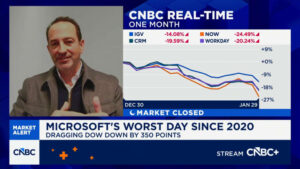Bank failures, interest-rate hikes and market volatility put stress on Americans and their finances during the first three months of 2023. But instead of worrying, use it as motivation to make sure you’re prepared for what’s ahead.
Retirement Tip of the Week: Take the second quarter of 2023 to refresh your retirement plans — even if you’re still planning to work for years.
The last few months — the last few years, really — have reminded us that when it comes to investing, there are many factors that can’t be controlled. But there are still plenty of things retirement savers can do to help them to be less stressed and better prepared for the future.
The best thing you can do right now? Focus on what you can control, say financial planners.
“I believe savers [and] investors would be best served by using the past 15 months as a wake-up call to be more attentive to their finances,” said Eric Amzalag, a certified financial planner and owner of the advisory firm Peak Financial Planning.
Related: Why I abandoned my 529 college savings plan and switched to Series I bonds instead
Take the next few months to do some housekeeping, said Rob Greenman, a certified financial planner and chief growth officer at Vista Capital Partners. That can include consolidating retirement plans, reviewing 401(k) plan fees and investments, and doing a checkup of all your assets.
Look at how much you’re spending and how much you’re saving. There are apps, such as Mint, that break down spending habits, but you can also simply review your bank and credit-card statements.
“If you find that you’ve spent too much on things that are not important to you, use that sum to set up a new automatic transfer to your emergency savings account — or better yet, an investment account to take advantage of the market decline,” said Michelle Gessner, a certified financial planner and the owner of Gessner Wealth Strategies. “The market is on sale. You can buy the same for less.”
Keep an open mind about portfolio performance, even when tickers might be red or your total balance might be lower than it was before. “Yes, your statements show that your balance is down, but it is a paper loss only and not a real loss,” Gessner said. “The market recovers after each decline, and when it does, you will want to have the benefits.”
Also read: Why would a financial planner team up with a nutrition coach? To attract millennials, of course.
As you freshen up your finances, don’t neglect tasks like creating or building up an emergency account, finding or continuing a relationship with a financial professional who will work in your best interest and researching other important retirement decisions, like when to claim Social Security, whether to do a Roth conversion, and how to make sure you have enough Medicare and other health insurance coverage, Amzalag said.
And, he said, spend less time worrying about what you can’t control — things like market performance, layoffs, Federal Reserve policies and mortgage-interest rates.
Learning about the FIRE movement, short for “financial independence, retire early,” might also be helpful. People who participate in FIRE often save aggressively so that they can retire at a young age, or they manage multiple sources of income to achieve their goals.
“We spend too much time as a society focusing on things outside our control, giving away our power,” Amzalag said. “This last 15 months has been a call to return to sound decision-making and centering ourselves around what we can control in our lives.”
OPINION: Are you falling behind on retirement savings? It’s time to catch up.
This post was originally published on Market Watch






